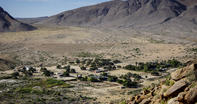The Pella Mission
Strangely, the fate of Pella, the first mission station in Namaqualand, is obscure. Some say that it was raided by Bushmen, who killed the minister and his family, causing the inhabitants to flee.

Certainly the traveller George Thompson reported, in 1824, that the place was deserted, but he did find another mission station a few hours away at T’kams – the priest in charge explaining that they moved around during the dry months to find water. Others say that the station endured (perhaps under the aegis of the Rhenish Church) before it was abandoned in 1872 because of an extreme drought that had blighted the region.
In any event, the Catholics established their first mission in Namaqualand at Springbok in 1869. Unfortunately, the copper boom which had been responsible for the creation of the town had gone bust and the place was severely short of Catholics to whom they could preach.
Undeterred, the plucky Father Gaudeul, from France, decided to take over the abandoned rectory at Pella. As the Catholic-written history of the Pella mission station hyperbolically recalls, “when the Lutherans got wind of these activities, they wrote to the Cape and made strong objections, but their letters arrived when everything had been settled.
There was weeping and gnashing of teeth, but the die was cast". Alea jacta est, indeed. By 1878, Pella boasted 100 inhabitants, 50 of whom were Catholic. In 1882, Father Jean Marie Simon arrived at the humble mission station in the middle of nowhere. He and his colleagues proceeded to build a small cathedral and a house for the nuns with only an encyclopaedia to guide them in their architectural endeavours. It took 7 years.
Father Simon would remain at Pella until his death in 1932, 50 years later. He became known as the ‘Bishop for the Hottentots’ and was an iconic figure in the area. From Pella, the Catholic Church went on to establish a number of missions across Namaqualand, Bushmanland and the Hantam Karoo.
A Blessing and a Curse
The various mission stations, Protestant and Catholic alike, proved to be a blessing and a curse. On the one hand, they contained clinics, schools and churches, and thus formed a network of social support for the beleaguered Khoikhoi and Bastaards who were reeling under the onslaught of trekboers and other modern interlopers.
On the other hand, however, the permanent villages that grew up around the stations encouraged a more sedentary settlement pattern, which contributed to the decline of the traditional migratory lifestyle. In later years, when schooling became compulsory for all children, the mission stations became essential components of the Khoikhoi’s existence and thereby drove the final nail into the coffin of their transhumance.
The indigenous Khoikhoi languages also suffered as a result of the missionaries’ education. Few Europeans could master the intricate tongue-clicks of the various local dialects and, although some material was translated into Khoikhoi, most of the communication between shepherd and flock was done in Dutch or English. As a result, only the Nama language (spoken in the remote Richtersveld and in southern Namibia) is still alive today – the sole survivor of a wider linguistic tradition that once covered much of South Africa.
Ticket of Occupation
In conclusion, the missionaries can be said to have had a stabilising yet disruptive influence on Namaqualand. They provided a variety of important social services, and gave the locals a small political voice. In many cases, the mission stations also fought for a ‘ticket of occupation’ that guaranteed permanent tenure for the indigenous people on the land around the station.
This was particularly important in the face of encroachment by white farmers and, later, the mining companies. But all this came at a cost and the government often removed power from the hands of the tribal chiefs and placed it with the heads of the mission stations instead.
The mission stations also forced the transient Nama herders to settle in one place, and thus undermined their traditional way of life. As they say, the Lord giveth and the Lord taketh away.
By David Fleminger